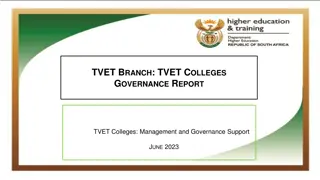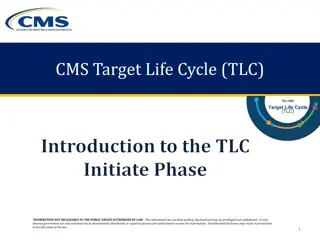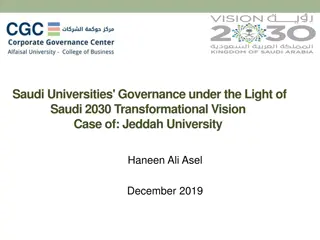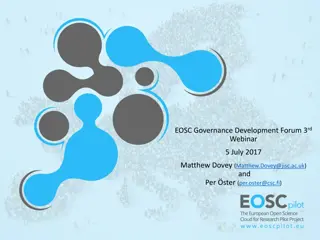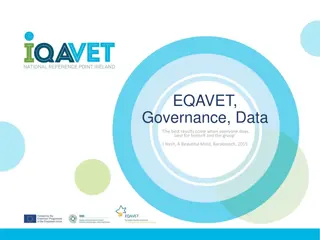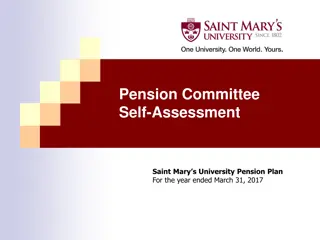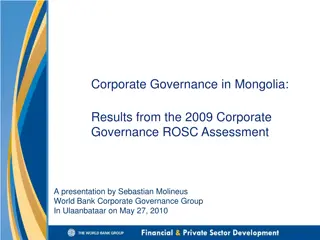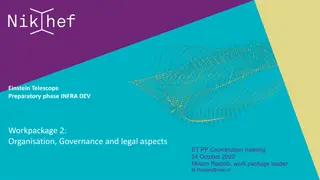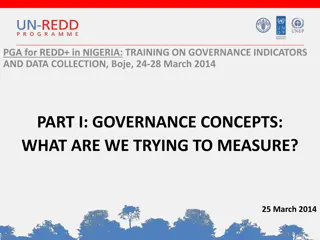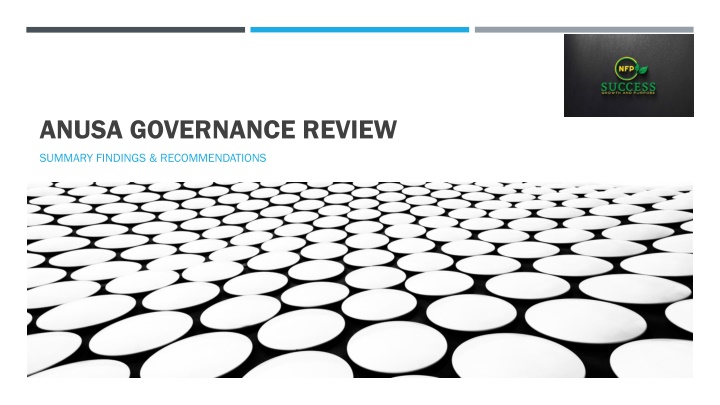
ANUSA Governance Review Summary Findings & Recommendations
ANUSA's governance review highlights findings and recommendations regarding its governing documents, representative structures, and opportunities for improvement. The review gathered input from student representatives, university stakeholders, and the broader ANU student community, emphasizing the importance of effective governance in a student-led organization like ANUSA.
Download Presentation

Please find below an Image/Link to download the presentation.
The content on the website is provided AS IS for your information and personal use only. It may not be sold, licensed, or shared on other websites without obtaining consent from the author. If you encounter any issues during the download, it is possible that the publisher has removed the file from their server.
You are allowed to download the files provided on this website for personal or commercial use, subject to the condition that they are used lawfully. All files are the property of their respective owners.
The content on the website is provided AS IS for your information and personal use only. It may not be sold, licensed, or shared on other websites without obtaining consent from the author.
E N D
Presentation Transcript
ANUSA GOVERNANCE REVIEW SUMMARY FINDINGS & RECOMMENDATIONS
TERMS OF REFERENCE TERMS OF REFERENCE The review shall consider: 1. ANUSA s governing documents, including its constitution and regulations; 2. ANUSA s representative and governance structures and practices; 3. The above areas with particular attention to ANUSA s recent transition to representation of postgraduate students; 4. Opportunities for improvement and reform of ANUSA s governance, mindful of ANUSA s nature as an independent, student-led organisation.
CONSULTATION In total 20 student representatives contributed to the review by participating in an interview. The review received 10 submissions from the broader ANU student community. Interviews were also held with the Operations Manager; Principal Lawyer; and Senior Student Assistance Adviser. Interviews were held with the following university stakeholders: Senior Adviser, Student Experience; Interim Director Student Experience; Manager, Corporate Governance and Policy; and Deputy Vice-Chancellor (Academic).
Executive Members (7 members): President: Oversees daily operations, represents students on the University Council and other committees, and acts as ANUSA s official spokesperson. Vice President: Focuses on internal education matters, coordinates student appeals, and supports the President. Treasurer: Manages ANUSA s finances, including budgeting and auditing. General Secretary: Responsible for internal administration, organizing meetings, and interpreting the constitution. Clubs Officer: Oversees the clubs program and organises events such as O-Week and Bush Week. Welfare Officer: Advocates for student welfare, addressing issues like housing, food security, and access to services. Education Officer: Manages higher education policy, organizes educational campaigns, and prepares submissions to government bodies. College Representatives (28 members): Four representatives for each of the seven academic colleges: Two Undergraduate Representatives One Postgraduate Coursework Representative One Higher Degree by Research (HDR) Representative General Representatives (14 members): Provide general support to the Association and assist with various projects. Academic Representatives (3 members): Undergraduate Coursework Officer: Represents undergraduate coursework students. Postgraduate Coursework Officer: Represents postgraduate coursework students. HDR Officer: Represents HDR students. Department Officers (7 members): Women's Officer: Represents female, non-binary, gender-diverse, and trans students. Queer Officer*: Represents LGBTQIA+ students. Environment Officer: Focuses on environmental issues. Indigenous Officer: Represents Indigenous students. International Students' Officer: Advocates for international students. Disabilities Officers: Represents students with disabilities. BIPOC Officer: Represents Black, Indigenous, and People of Colour. Parents and Carers Officer (1) Supports student parents and carers. Total SRC = 60 student representatives Total SRC = 60 student representatives
SUMMARY FINDINGS Overall, ANUSA has a sound governance framework that has largely served it well to date. Historically, ANUSA has not been highly factionalised, which has facilitated effective governance, service delivery, student support, and collaborative student-staff relationships. The potential for increased factionalism among student representatives may test ANUSA s governance in the future. To address this, ANUSA's governance must be robust and adaptable.
SUMMARY FINDINGS The expanded role of ANUSA in representing postgraduate students has introduced new challenges. Postgraduate students, often less interested in student politics, require tailored engagement strategies to meet their specific needs. While politics is an inherent aspect of ANUSA, it should not overshadow the principles of good corporate governance. Confidence in ANUSA s governance is vital for ANU students and the university. The review identified a number of strengths in ANUSA's governance, and also found a range of challenges and risks that, if addressed, could enhance its ability to represent and service the ANU student community more effectively.
PARLIAMENT OR BOARD? The ANUSA Constitution names the SRC as the committee of management but vests management powers in the executive, individually and collectively. ANUSA SRC and executive members hold significant legal and governance responsibilities and can be held accountable, both individually and collectively, for their actions and decisions on behalf of ANUSA. Current governance arrangements mean that ANUSA combines the roles of both a governing board and a parliament. These roles that are inherently different: Members of boards have a fiduciary duty to act solely in the interests of the organisation which they govern. Members of parliament have no such duty - they can act in line with their sectional interests, without regard for the health of the institution itself.
PARLIAMENT OR BOARD? In a parliamentary political context, disagreement in which different policies are advocated can only be resolved ultimately by one side obtaining the power to make its viewpoint prevail over the other. In contrast, an effective governing board establishes a culture of mutual respect, honesty and openness that encourages constructive debate, takes collective responsibility for its decisions and is shaped by a common purpose. While politics is a key element of the Students Council, it shouldn t replace good corporate governance principles.
PARLIAMENT AND A BOARD Many universities in Australia and overseas have adopted a bicameral structure for student leadership and representation comprising: a Governing Board (often incorporating both elected students and co-opted external members) which has ultimate responsibility for the governance, financial and strategic direction of the Students' Union; and a Student s Representative Council which is essentially the parliament of the student body and gives expression to the student voice and politics. Arc Board Union board Board of Directors Student Representative Council Students Representative Council Student Representative Council Statewide Board of Management The State Council
GOVERNANCE STRUCTURES The ANUSA Constitution contains a contradiction between section 14(1) and section 10(1)(a). Section 14(1) designates the SRC as "the committee of management," while section 10(1)(a) assigns the responsibility to "manage the affairs of the association" to the executive. Section 14 grants the SRC specific powers that do not encompass managerial authority, such as adopting resolutions on policy. In contrast, section 10 vests numerous specific managerial powers in various members of the executive. This discrepancy creates confusion and ambiguity in the interpretation of the constitution. One interpretation is that the SRC holds 'symbolic' authority, whereas actual managerial responsibility is vested in the executive. This raises concerns about the clarity of overall governance responsibility within the organisation. Without a clear delineation of roles, the effectiveness and stability of ANUSA s governance structure may be compromised.
GOVERNANCE STRUCTURES The SRC primarily serves as a forum for political motions and debate, which limits its capacity to focus on the overall governance of ANUSA. Additionally, with 60 representatives, the SRC is too large to effectively govern. In practice, in line with managerial responsibilities of the executive in the ANUSA Constitution, the executive acts as the governing board of the organisation. The review found strong student support for formalising the executive s role in the constitution to reflect its actual function as the governing body of ANUSA. The current inconsistencies in the ANUSA Constitution concerning the role of the executive and the SRC introduce legal risk. Formalising the executive as the governing committee of management will remove potential uncertainty that could undermine the stability and sustainability of the organisation.
GOVERNANCE STRUCTURES The Education Council (EDC) is an integral part of ANUSA governance, providing a structured forum for analysing and addressing academic issues that impact the student body. A restructure of the SRC offers an opportunity to reinvigorate the EDC and to raise its profile within the student community. Meetings could be chaired by the education officer and made more interactive and engaging through workshops, discussion groups, and brainstorming sessions, encouraging greater involvement and fostering a more collaborative and dynamic environment. The review found that the majority of the committees mandated in the constitution are not functioning effectively, with many consistently struggling to achieve a quorum.
BALANCING ACTIVISM AND INCLUSION The review received universal praise for the range and quality of services ANUSA offers. Many students expressed concerns that ANUSA s political activism overshadows its advocacy and support services. Additionally, many students reported experiencing ANUSA as unwelcoming, alienating, and unsafe. Political activism is, and will always remain an important part of ANUSA s role. At the same time, ANUSA needs to take this feedback seriously and implement strategies to prevent its political activism from unintentionally creating barriers for students wishing to access its services.
BALANCING ACTIVISM AND INCLUSION ANUSA must draw a clear dividing line between their services and their activist elements and stress that the political stances of the former do not impact the results and accessibility of the latter. We are struggling to do our duty of representing all students. A lot of the student body has a negative perception of ANUSA. ANUSA should develop an alternative governance structure which sees that ANUSA s apolitical student services are not affiliated with the activist stances promoted within it. A lot of students want more service provisions rather than endless motions on geo-political conflicts. Students are divided on what ANUSA is, Palestine issue is exacerbating that. Some people see ANUSA as services and student assistance while others see it as an activist body. A lot of ANUSA spaces are quite hostile. ANUSA has not been as balanced as it could be some things have been neglected. Currently people think that ANUSA is for political people Very few postgrads are interested in doing political things.
EFFECTIVENESS OF SRC AND THE EXECUTIVE The conduct and organisation of SRC meetings is a critical part of the governance process. Feedback from students about SRC meetings highlights significant challenges: Very aggressive behaviour turns people off. SRC meetings are scary Meetings are too long, have too many people and fail to foster a culture of discussion and exchange of ideas. By far the thing ANUSA does the worst is its meetings A big portion of the people cannot separate the personal from the political. Having people being very aggressive towards you is not good. A lot of people are discouraged from getting involved. There is a lot of shouting attacking people rather than their ideas. The thing ANUSA does worst is its meetings. It s very difficult to be in the space, it s very hostile. SRC just feels like a distraction it is not a very productive space.
EFFECTIVENESS OF SRC AND THE EXECUTIVE Addressing these challenges is crucial for making SRC more welcoming and effective for all students. Both the broader community and the ANU student body are seeking honesty, integrity, and inclusivity from their elected representatives. Instead of mirroring the negative behaviours seen in mainstream politics, (as highlighted in Set the Standard: Report on the Independent Review into Commonwealth Parliamentary Workplaces by Kate Jenkins), ANUSA should look at the recommendations in this report and, where relevant, apply them to the operations of the SRC. This approach will help rebuild and maintain student trust and engagement. Addressing these challenges is crucial for making ANUSA more welcoming and effective for all students.
EFFECTIVENESS OF SRC AND THE EXECUTIVE Section 1.4 of the standing orders in the ANUSA constitution refers to conduct at meetings. This section is very limited in scope as it focuses only on procedural aspects. These rules do not adequately address behavioural expectations to ensure meetings are productive, inclusive, and respectful. The standing orders need to be expanded to include specific behavioural guidelines and outline procedures for addressing disruptive behaviour, including warnings and removal from meetings, to ensure meetings run smoothly and respectfully.
EFFECTIVENESS OF SRC AND THE EXECUTIVE The review found that overall, the executive fostered a collaborative environment characterised by mutual respect, honesty, and openness. This approach enabled constructive debate and collective decision-making which allowed the executive to operate more efficiently and effectively, avoiding the tensions that plagued the SRC. Most interviewees considered the executive to be accountable, consistently demonstrating transparency in their decision-making processes and outcomes: High degree of accountability within the executive Less accountability at the SRC level. The executive functions very well. Exec is quite effective they work together So much is dependent on the culture of the exec When the exec deals with issues it is not personal. The exec reporting process is good.
ELECTION REGULATIONS Low voter turnout in university student unions, including ANUSA, is a common issue. Many students feel disconnected from ANUSA s activities and believe their vote will not make a difference. This issue is even more pronounced among postgraduate students, who have demanding schedules and different priorities. This perception alienates the broader student body, including postgraduates, who already feel ANUSA does not represent their interests. Engaging postgraduate students is particularly important, as their perspectives are essential for comprehensive representation. If ANUSA does nothing to address this, its reputation as an organisation primarily serving an activist political fringe will persist and become more entrenched.
LEADERSHIP ROLES ANUSA's leadership structure features a unique arrangement where the president holds a full-time role that encompasses both the responsibilities of a chair and a CEO. This dual role is distinctive in the context of student unions and carries significant implications for the governance and operational effectiveness of the organisation. As the CEO of ANUSA, the president is responsible for overseeing the day-to-day operations of the association, managing staff, and ensuring the implementation of policies and programs. The president also provides strategic leadership and direction for ANUSA, representing the student body in discussions with university administration and external stakeholders, advocating for student interests, and ensuring that ANUSA's activities align with its goals.
LEADERSHIP ROLES The dual role centralises leadership within ANUSA, which can streamline decision-making processes and provide clear and consistent direction for the organisation. Having one individual at the helm can facilitate quicker responses to emerging issues and ensure cohesive strategy implementation. With the president serving as the key executive leader, accountability is concentrated in a single position, enhancing transparency as the president is directly answerable to the student body for both governance and operational outcomes. As a full-time position, the president has the capacity to dedicate significant time and energy to the role. This enhances the leadership presence within ANUSA, allowing the president to be more engaged with student issues, more accessible to the student body, and deeply involved in the daily operations of the organisation.
LEADERSHIP ROLES It is also important that ANUSA acknowledge and manage the risks inherent with the combination of these roles. The president must balance the governance oversight typically provided by the chair of a governing board with the executive actions required of a CEO, which can create situations where the President is effectively overseeing their own performance. Feedback to the review also highlighted that the president needs to carefully balance their responsibilities as both chair and CEO. To effectively represent ANUSA as an inclusive organisation for all students, the president needs to be cautious about becoming too involved in divisive political campaigns, as this can compromise ANUSA being, and being seen to be, an organisation that is open to, and supports all ANU students. Overall, review participants strongly supported retaining the combined role for the president, and overall, they viewed the performance of both the current and immediate past presidents positively.
LEADERSHIP ROLES The constitution states that the ANUSA treasurer must oversee financial affairs, arrange audits, prepare and present financial reports, assist representatives with financial organisation, and manage sponsorships. Being treasurer of a not-for-profit organisation is a great responsibility and undertaking this role could be a challenge for many students. To make the role more manageable for students, ANUSA could delineate more clearly in a position description, the treasurer's strategic responsibilities from the operational tasks handled by the financial controller. The treasurer could focus on high-level financial oversight, policy-making, and strategic decision- making, while the professional staff member handles detailed financial management.
LEADERSHIP ROLES Many interviewees raised concerns regarding the roles of the welfare officer and education officer. It was widely perceived that there had been too much focus on pro-Palestine campaigning over recent months, taking away from core education advocacy and student welfare issues. Additionally, there were observations that the responsibilities of the two roles were not clearly distinct, leading to both officers frequently engaging in similar activities. Without clear delineation of roles and responsibilities, it becomes difficult to hold student representatives accountable for their performance in their roles. The absence of well-defined roles and responsibilities creates confusion and inefficiency - clear position descriptions are essential to ensure that each officer understands their specific duties and priorities.
LEADERSHIP ROLES ANUSA has four college representatives for each of the seven academic colleges at ANU. Feedback noted these roles are highly specialised, and students with purely political ambitions often lack the skills and knowledge to perform effectively. Conversely, those interested in representing their academic college find the SRC's political environment off-putting. There was broad support for removing college representatives from the SRC, reducing its size from 60 to 32 members. College representatives should remain part of the EDC, focusing on academic interests without political entanglement. This change would provide an opportunity to review the EDC's terms of reference to ensure a clear purpose and effective access to the SRC and the executive.
LEADERSHIP ROLES Department officers manage policy and advocacy for seven key areas: BIPOC, Disabilities, Environment, Indigenous, International Students, Queer*, and Women. Each officer represents their constituency's interests, ensuring their voices are heard within the broader student community. The inclusion of the environment officer raises questions about its fit within ANUSA's departmental structure, as it does not represent a historically marginalised constituency. The constitution requires departments to develop their own individual constitutions and regulations, creating a perception that they are separate from ANUSA. This leads to the false impression that departments operate as independent entities. However, the SRC and the Executive hold ultimate legal responsibility for the actions of department officers. This arrangement creates significant governance risks for ANUSA, as it must manage the actions and decisions of these departments without clear alignment or oversight.
LEADERSHIP ROLES General representatives play a valuable role in representing diverse student concerns and nurturing future leaders within ANUSA. The review found that they are perceived as having the lowest status and lacking accountability. Despite initial dismissal of their role, student interviewees advocated for retaining gen reps due to their importance in providing diverse representation and fostering future leadership. ANUSA could enhance the role of gen reps by offering a small honorarium for attendance at SRC meetings, targeted training, development opportunities, and clear accountability mechanisms to prepare them for future leadership positions.
LEADERSHIP ROLES The parents and carers officer position transitioned from PARSA to ANUSA after PARSA's defunding. Initially a part-time role of 5 hours per week, it addresses the unique challenges faced by student parents and carers. However, it remains an anomaly, reporting to the president but not part of the executive or a department. As the university does not collect data on students' parenting or caring responsibilities, it is difficult to assess demand for establishing a parents and carers department. To make the role more manageable for post-graduate students (who are more likely to be parents or carers), ANUSA could consider having several students share responsibilities, maintaining it as a part-time position with a stipend that reports to the executive, and providing additional support measures like administrative assistance and professional development.
RELATIONSHIP BETWEEN STUDENT REPS AND STAFF A key governance strength of ANUSA lies in the positive and collaborative relationships between student representatives and ANUSA staff. Longstanding staff provide essential stability and a wealth of knowledge, supporting each new cohort of student representatives. This continuity is crucial for sustaining initiatives and retaining institutional knowledge. Given that key senior staff have been with ANUSA for years, it is important to think about how to manage future transitions in the event of their eventual departure. Without proper succession planning (for both staff and student representatives) ANUSA risks losing the collaborative and positive culture fostered over many years.
INDUCTION & TRAINING Most student interviewees reported that they found ANUSA's induction and handover processes relevant and well-delivered. In addition, ANU offers AICD training for senior student office holders to enhance their governance and leadership skills. The constitution requires each executive member to meet with the president at the start of their term to understand their roles, set goals, and outline development actions, documented in the statement of expectations form. It is important for the president to undertake this task each year. Some department officers reported a lack of support from the executive in facilitating ongoing training, such as Lifeline crisis support.
REMUNERATION Many student representatives expressed concerns that the significant hours they dedicate to ANUSA work exceed their remuneration. However, stipends are not meant to reflect hours worked but to provide reasonable compensation while maintaining the voluntary nature of student leadership roles. An open discussion is needed about volunteer hour expectations and the stipend's purpose. There is no objective performance framework in place for department officers whose roles involve a high level of responsibility and workload. Additionally, some department officers choose to share a portion of their stipend with their collective. However, there is no transparent framework for this, so it is determined by each individual department officer. Long hours and overwork can lead to stress and burnout. ANUSA needs to ensure that realistic workloads and boundaries are established for student representatives. This could include strategies such as: redistributing tasks and responsibilities; setting realistic goals and deadlines; maintaining open communication about workload and resources; and monitoring student representatives workloads and well-being
REMUNERATION Considering elected student representatives as staff members is not advisable for several reasons. Firstly, the primary role of elected student representatives is to advocate for, and represent their peers. This role is inherently different from that of staff members, who are employed to perform specific duties under the direction and supervision of their employer. Elected representatives need the independence to make decisions and advocate effectively, free from the constraints of an employer-employee relationship. This independence could be compromised if they were treated as staff, potentially creating conflicts of interest and limiting their ability to challenge institutional policies or practices. Treating elected representatives as staff would also introduce legal and administrative complexities. Compliance with employment regulations would require significant administrative resources and could strain ANUSA s budget, reducing the resources available for other student services and initiatives. Financial incentives should not overshadow the motivation to serve peers. Ensuring that these roles remain fundamentally volunteer-based helps maintain the integrity and purpose of student governance.
REPRESENTATION OF POST GRADUATE STUDENTS To effectively represent postgraduate students within ANUSA, it is essential to address their distinct interests and priorities, which often differ from those of undergraduates. Postgraduate students typically focus more on their academic and professional development and show less interest in student politics. Replicating the undergraduate approach to representation and engagement will not effectively cater to postgraduate students. There was strong acknowledgement among students interviewed that the current system of election to the SRC and executive disadvantages postgraduate students. Many postgraduate students are only on campus for short periods and are combining their university studies with full- time jobs and family commitments. They have limited time to run an election campaign, attend lengthy meetings and take on demanding roles
REPRESENTATION OF POST GRADUATE STUDENTS Many postgraduate students reported a widely held perception that ANUSA is only interested in engaging with politically active students which creates a barrier to their engagement. The review found that ANUSA has taken steps to engage with post graduate students through a range of initiatives including newsletters and specific events. However, to address the widely held perception that ANUSA is purely political, ANUSA may need to consider targeted communication strategies to convey the benefits and services the organisation offers to postgraduates.
REPRESENTATION OF POST GRADUATE STUDENTS While a number of the postgraduate students interviewed for this review, believed ANUSA should consider establishing one or two dedicated identified postgrad positions, the majority of students interviewed did not support this proposal. They argued that nothing prevents postgraduate students standing for election for any of the SRC roles. Given this resistance, ANUSA needs to consider alternative ways to ensure postgraduate students have a voice in decision-making processes.
REPRESENTATION OF POST GRADUATE STUDENTS Politics is a bit of a barrier for postgrads. I worry that ANUSA s challenge of integrating postgrads is that the time commitment is a barrier. Postgrad interest is definitely on the service side. Postgrad events need improving. To ensure postgrad representation you need identified postgrad positions. The entire general reps are undergraduate and there is no motivation for postgrads. We are not able to get people to meetings. Everyone who comes here to do a Masters needs a job at present it is too reputationally risky to include ANUSA on my resume. Undergraduate interests are not necessarily postgrad interests. Exec needs a post grad rep.
RECOMMENDATIONS Constitutional Amendments 1. Amend the constitution to formally designate the executive as the primary governing body of ANUSA with legal responsibility for key decisions, fiduciary duties, and overall governance. This shift would address several current risks associated with the SRC serving as the committee of the association . These risks include the current contradictions and ambiguity regarding the roles of the SRC and the executive contained in the constitution; the inefficiency and ineffectiveness of managing governance with such a large and diverse group; the potential for factionalism to undermine unified decision-making; and the challenges of maintaining fiduciary duties in an adversarial, highly contested political environment.
RECOMMENDATIONS To ensure clarity and strengthen governance, section 10 of the constitution that relates to the role of the executive should explicitly state that the Executive is collectively responsible for the strategic leadership of ANUSA and is required to: act in the best Interests of ANUSA at all times; make decisions with care, diligence, and honesty, ensuring all actions benefit the association; avoid situations where personal interests could conflict with those of ANUSA and maintain transparency in their actions; maintain confidentiality of sensitive information acquired through their role, ensuring it is not misused for personal or political gain; and collectively ensure accountability within the governance structure. 2.
RECOMMENDATIONS Expand Section 1.4 of the ANUSA Standing Orders (Conduct at Meetings) to include behavioural rules that ensure all voices are heard, maintain respectful and constructive discussions, prohibit interruptions, and outline clear consequences for disruptive behaviour. This will foster a more inclusive and effective SRC environment. 3. 4. Retain the current membership of the executive, along with the current structure with the President as both chair and CEO. 5. Amend Section 9 (Representatives) of the constitution to remove college representatives from the SRC and prioritise their roles to focus on the EDC, allowing them to concentrate on academic interests and advocacy without the distraction of broader political issues.
RECOMMENDATIONS 6. Amend Section 11 (Departments of the Association) of the constitution as follows: Remove the requirement for departments to have their own constitutions and regulations. Instead, implement department charters that outline the purpose, objectives, authority, and reporting processes to the SRC and the Executive. Department and committee charters do not need to be included in the constitution. Charters provide flexibility, ensure alignment with ANUSA's overall governance framework, and simplify oversight and accountability. Remove the specific reference to the amount of payment (currently set at no less than $5,000) from the constitution and establish a dynamic policy and procedure framework for determining the funding allocated to each department based on current needs and priorities. Remove environment as a department to reinforce that the purpose of autonomous departments is to represent and advocate for historically marginalised student groups. If this cannot be agreed, consider making the environment officer a standalone specialist officer similar to the parents and carers Officer.
RECOMMENDATIONS 7. Remove Section 18 (Committees of the Association) of the constitution and abolish the existing: Education Committee; Disputes Committee; Financial Review Committee; Academic Management Committee; and Parents and Carers Committee.
RECOMMENDATIONS 8. Amend Section 15 (Education Council) of the constitution to give the education officer the responsibility for convening, chairing and organising the EDC with the vice president being the only other executive member represented on the council. Use this change as an opportunity to: reinvigorate the EDC and transform it into a more effective forum for academic discussions, strategy formulation, policy influence, and post graduate engagement; review the EDC s terms of reference to ensure a clear purpose and effective access to the SRC and the executive; consider expanding membership to provide for a number of open merit-based positions to enable non-elected post graduate students the opportunity to participate along with the college and academic representatives.
RECOMMENDATIONS 9. Review the ongoing requirement for an education committee in addition to the EDC. If assessed as still having a useful purpose, from a governance perspective, the education committee can be established by regulation or policy and should function as a sub-committee of the Education Council to ensure better alignment and coordination between these bodies. As a sub-committee of the Education Council, the education committee could focus on operational activities, policy implementation, and advocacy, engaging directly with the student body to address specific educational concerns. This arrangement the Education Council to concentrate on strategic oversight, policy formulation, and broad representation, ensuring that high-level academic issues are effectively addressed. 10.Streamline the ANUSA constitution by removing detailed operational elements, including redundant roles and non-functioning committees, and replacing them with adaptable policies and procedures. This approach allows for quicker and more effective responses to changing student needs and priorities, providing the flexibility to adapt roles and committee functions as necessary.
RECOMMENDATIONS Role Clarity and Accountability 11. Review and update the ANUSA code of conduct that outlines behaviours expected from all employees, elected officials, club and society representatives, and individuals in a relationship with ANUSA. The updated code of conduct should include clear consequences for breaches and a robust enforcement mechanism. The code of conduct should also form part of the induction for all new student representatives and staff. 12. Once the executive is established as the governing body of ANUSA, every 3-5 years, the executive should engage in a strategic planning process that involves ANUSA student representatives, and ANUSA staff to develop a clear, well-researched, strategic plan that sets out broad goals and establishes priorities for the organisation. 13 As chair and CEO of ANUSA, the President must weigh the extent of their involvement in divisive political campaigns to avoid undermining their ability to represent ANUSA as an inclusive organisation for all students. This dual role demands a careful balance between activism and impartiality to ensure effective support and representation for the entire ANU student body. This aspect of the role should be incorporated in the position description. 14 Ensure there is clear differentiation and accountability between the roles of education officer and welfare officer. Clarify the responsibilities and expectations for each position to avoid overlap and ensure both officers are accountable for delivering on their core responsibilities relating to education and student welfare. .
RECOMMENDATIONS Clearly define the role and responsibilities of the parents and carers officer within ANUSA s governance framework, ensuring it reports directly to the executive. Develop a detailed position description to outline the objectives, duties, and expected outcomes. 15. 16 To complement key role summaries contained in the constitution, develop more detailed position descriptions for each student representative role that includes: the title and purpose of the role, key responsibilities and duties, any required skills (eg financial knowledge and skills for role of treasurer), reporting relationships, and performance expectations. Regularly review and update these descriptions to reflect changing needs and responsibilities. 17 When committees are established, ensure they have a clear purpose and are regularly monitored to ensure their continued relevance and effectiveness. A committee charter should detail why the committee exists, what it needs to accomplish, and how it will go about its work. 18 Ensure that the constitutional requirement for each executive member to meet with the president at the start of their term is implemented each year. This meeting should focus on understanding their roles, setting goals, and outlining development actions, documented in the statement of expectations form. Establish a process for performance reviews and clear consequences for non- performance, ensuring that executive members who fail to meet their outlined responsibilities are held accountable. 19 Develop and publish transparent guidelines for setting and managing stipends and honoraria. This will promote fairness and accountability, ensuring all members are aware of how compensation decisions are made and the criteria used.
RECOMMENDATIONS Student Engagement and Communication 20. Develop a communication strategy that reassures the wider student community about the impartiality and inclusivity of ANUSA s services. This should involve regular updates, transparent decision-making processes, and feedback mechanisms to address student concerns promptly and inclusively. 21. Establish more effective communication channels to keep the student community informed about the EDC s role, activities, meeting agendas, and outcomes. Utilising social media, newsletters, and the ANUSA website for regular updates would also enhance transparency and engagement. While the website currently contains information about the activities of the education committee, it lacks any information about the EDC. 22. Collaborate with the university to collect data on enrolled students with parenting or caring responsibilities. This information will help assess the demand for specific support and resources, ensuring that the parents and carers officer can effectively address the needs of this student population.
RECOMMENDATIONS Complaints and Dispute Resolution 23. Develop a clear and well understood procedure to manage internal complaints and dispute resolution. Any process for dealing with disputes or misconduct will need to comply with the requirements of the Associations Incorporations Act 1991 (ACT). The process should include provisions to: facilitate informal complaint resolution mechanisms where appropriate; appoint an external independent person to deal with a complaint or dispute when needed; incorporate processes for timely, reasonable and workable sanctions and consequences; protect students and staff from being victimised because they have made a complaint; protect students and staff from vexatious and malicious complaints; and ensure appropriate confidential records are kept about complaints and that this information is stored and managed appropriately.
RECOMMENDATIONS Training and Development 24. Provide targeted training, mentorship, and a small honorarium for gen reps to enhance their effectiveness and engagement. This support will encourage their active participation and development as future leaders, ensuring they have the necessary skills and resources to fulfill their roles effectively. 25. Ensure continuous training opportunities for all roles, addressing specific needs and providing support for department officers. This training should be tailored to the unique challenges and responsibilities of each role and should include both initial induction and ongoing professional development. 26. Implement measures to establish realistic workloads and boundaries for student representatives. These measures should include strategies such as redistributing tasks and responsibilities, setting achievable goals and deadlines, maintaining open communication about workload and resources, and monitoring the workload and well-being of student representatives.
RECOMMENDATIONS Post Graduate Engagement 27. Establish merit-based, non-political roles specifically for postgraduate students to ensure their voices are heard. These roles could include advisory roles and representation on committees, or working groups with a focus on specific issues such as academic support, student welfare, and university policies. This approach encourages participation from postgraduate students who may not be interested in political roles but are keen to contribute to the ANUSA. 28. Build on existing engagement strategies by consulting with postgraduate students to ensure initiatives and activities addresses their specific needs and priorities.
RECOMMENDATIONS Post Graduate Engagement 29. Proactively contact international postgraduate students before they arrive in Australia. Use this as an opportunity to introduce ANUSA, provide information about available services and support, and build strong, early connections to ensure these students are well-supported from the outset. 30. Since many postgraduates only attend campus for classes or college-based activities, organise events within individual colleges. This approach will make it easier for postgraduate students to participate and engage with ANUSA. 31. Promote the services and benefits ANUSA offers to postgraduate students to dispel the perception that ANUSA only serves political activists. Implement targeted marketing campaigns, informational sessions, and direct outreach to postgraduate student groups. Utilise platforms and strategies that resonate with the postgraduate community, highlighting success stories and testimonials to build trust and demonstrate ANUSA s commitment to all students.



